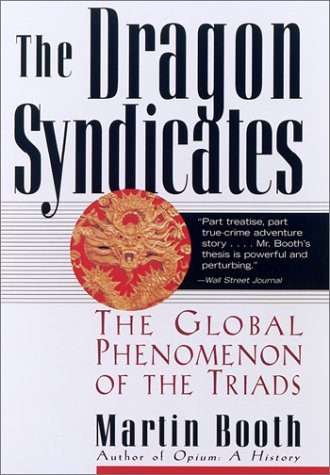
The Dragon Syndicates: The Global Phenomenon of the Triads by Martin Booth
My rating: 5 of 5 stars
Based on the name of one Chinese secret society, the sanhehui 三合会, triad is the term we use in English to describe them in general. In modern-day China, they are referred to as hei shehui 黑社会 or black societies.
Martin Booth, who spent twelve years as a child in Hong Kong, retells the history of these societies in depth. Starting as underground groups of rebels against the Qing emperors after the fall of the Ming Dynasty, they saw themselves as patriots. The Ming had been true Chinese rulers and the Qing barbarian Manchu upstarts. Centuries later, republican Sun Yat-sen overthrew the Qing with heavy support from the triads. Sun himself was a member of several secret societies. Mission accomplished, the triads then fell into criminality, and the leader of nationalist China, Chiang Kai-shek, is painted here as the biggest gangster of the lot. After 1949, the communists didn’t tolerate the triads, so the focus of their activities shifted to Hong Kong. The gangs ran rampant in the colony, but with effort, the British managed to reduce corruption in the police force and convict some of the bosses. Ultimately, the triads are so embedded they can never be eradicated. Booth also describes the complex and lengthy initiation ceremonies that are all but extinct. Johnnie To’s 2005 film Election features, to my limited knowledge, the most intricate portrayal of triad customs in Hong Kong cinema. I recommend this movie and the 2006 sequel Triad Election.
I’d like to read a book about the 2019 triad attack on protestors at Yuen Long metro station that traced triad history from the late 90s, when Booth’s history ends, until the present day. Maybe a local author has written such a book but it hasn’t been translated into English. But who in HK would dare even indie publish it? In this 2019 case, the triads worked with the Chinese government.
As other reviewers have noted Booth doesn’t include footnotes. For some his claims, like the one below, I would’ve liked to know the source.
“When a triad prostitute reaches the end of her working life, usually by the age of thirty, several courses of action lie ahead. She may be sold as a domestic servant, often in the Middle East where she will disappear into an Arab household never to be seen again and where, after a harsh life of abuse, she may well be killed.”
Another reviewer has remarked that Booth uses outdated terms, offensive to women. On reading this, at first, I raised my eyebrows and marvelled that the cancel culture police had reached this obscure work that’s not available in digital form. However, Booth’s using the words ‘whore’ and ‘hooker’ indicates his strong distaste for the sex industry – a little surprising for one who apparently grew up roaming the streets of Hong Kong alone? I look forward to reading his memoir ‘Gweilo’ to get a better sense of the man.
I have to share the following quote: “In the 1980s, Kowloon Walled City contained one of the biggest manufacturers of rubber penises in the world: to visit the factory was like entering a bizarre, Salvador Dali-esque subterranean world, with racks of latex male organs hanging up to dry like sausages in a butchers shop.”
F.E. Beyer is the author of Buenos Aires Triad
View all my reviews
